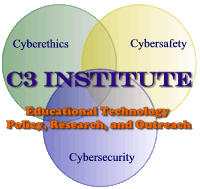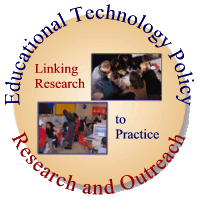

![]()
![]()
![]()
![]()
![]()
![]()
![]()
![]()
![]()
C3™ Institute Goal 4:
Help increase the workforce pipeline of information security, information assurance and information technology professionals in the MD/VA/DC area and nationwide.
The DC metropolitan area has special concerns related to IT/IA because it is the seat of the federal government and houses the central offices of many federal government and military agencies such as the Departments of Defense and Homeland Security. Many of the Information Technology (IT) businesses--both mainstream and minority-owned--in the region contract with the federal government to perform critical and highly sensitive tasks. There are literally thousands of computers in the area that contain sensitive and/or classified information that may be vital to national security. “Northern Virginia is second only to Silicon Valley (California-USA) in the number of Information Technology (IT) companies and employees, and approximately 60% of the United States’ Internet traffic is routed through Northern Virginia . Two locations in Northern Virginia control 60 percent of the world’s internet traffic.
Although most cyberattacks, 90 percent of which come through the Internet, "can be avoided if enterprises … develop incident response procedures to monitor and detect an attack" (Armstrong, 2002, p. 2). A CSI/FBI survey provides strong evidence that neither technologies nor policies alone provide an effective defense. Indeed, a variety of cybersecurity professionals are needed in the areas of computer security and data assurance, from the technician to the engineer to the architect levels, but “finding people with the full suite of skills is challenging" (National Research Council, 2001). In a letter to Congress, Tom Santaniello of CompTIA reported that in 2001 several hundred thousand IT-skilled jobs went unfilled and that this shortage carries with it critical national security consequences. Prior to 9/11, 50% of security positions in the D.C. area were unfilled. Several homeland security and high-tech experts warned that the U.S. “is facing an alarming shortage in skilled workers to protect the nation's critical infrastructures from cyberterrorism and other threats” (Peterson, 2002).
The C3™ Institute has several initiatives to help increase the workforce pipeline of information security, information assurance and information technology professionals in the MD/VA/DC area and nationwide
C3™ Institute Goal 4 Initiatives:
- An NSF ATE (Advanced Technological Education) grant sponsored The
CyberWATCH Regional Center which was established to address:
- The lack of cybersecurity/information assurance (IA) curriculum at many higher education institutions
- The alignment of security curricula from high school through graduate school
- The need for faculty development and expertise in IA
- The shortage of a highly skilled security workforce in the fields of information assurance and digital forensic
- The C3™ Institute will take the K-12 lead in the CyberWATCH
initiative. This will include professional development for educators
through the annual Cyberethics, Cybersafety, & Cybersecurity (C3)
Conference, and a series of guidance counselor workshops throughout
Maryland, the District of Columbia and northern Virginia. A three week
residential program will be offered to rising junior and high school
students via the Young Scholars Program: Students, Learning and Technology,
and an after school enrichment program will be developed specifically
focusing on helping girls understand the plethora of career opportunities
in the cybersecurity field.. [Press
Release]
- Cool Careers in Cybersecurity for Girls Workshops [More]
- Students, Learning and Technology: Young Scholars Program Cybersecurity activities and career information are weaved throughout three weeks of dynamic and challenging educational technology activities through a variety of computer applications, field trips, guest speakers, and LOGO based computer learning environments - all while having fun! [More]
- IT/IA School Counselor Workshops. Increasing the pipeline to the IT and Information Assurance (IA) workforce starts in the K-12 environment. Guidance counselors are asked to inform students of possible career choices. In many cases, if students indicate an interest in technology, guidance counselors associate technology with computer science and/or engineering degrees or programming occupations and therefore lead students down only one path. If the students are not able to enter a full degree program they may choose another occupation, not realizing the multiple routes and certification options. Additionally, girls are often “turned-off” by the options guidance counselors offer them. Guidance counselors are critical in the career choices of students, but do not know of the variety of opportunities presently available. Workshops are offered to introduce counselors to current and future IT and IA career opportunities, and the multiple choices within these categories, as well as, the multiple pathways to enter the workforce in these areas. Industry employers will be asked to speak to participants about career opportunities, student internships, externships and other related opportunities. CPU options are available. [More]
- Research: The C3™ Institute has been actively engaged in studying the issues, problems, and relationships associated with Cyberethics, Cybersafety and Cybersecruity in the K-16 setting. Specifically, we have done extensive work exploring the perceptions, conceptualizations and practices of teachers and students in regards to C3 content and have developed a database of case study scenarios.
| Copyright © 2007 Educational Technology Policy, Reserach, and Oureach, Inc. http://www.edtechpolicy.org dpruitt@umd.edu |
 |